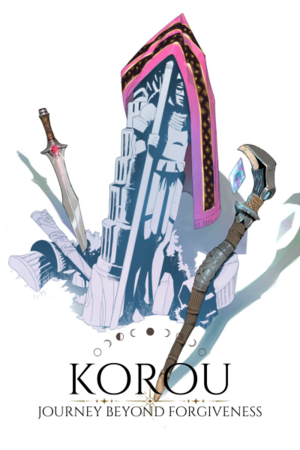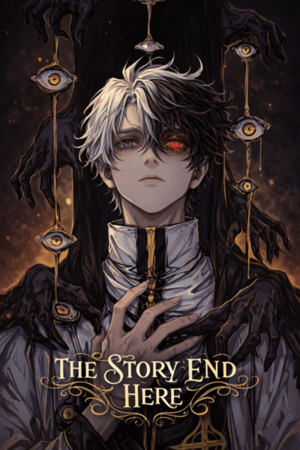Chapter 5:
The Pursuit Of Dead Languages
Korou: Journey Beyond Forgiveness Volume 1
The class that day was veiled with an arcane presence, one that even Anu, despite his stubborn empiricism, couldn’t shake away. His lecture, unlike previous ones, was tailored to his domain. The cryptic symbols, slumbering languages, and their decipherment. That was what the young scholar excelled in. With the worm-eaten, tattered volume of Epigraphica Indica tucked under his arm, he made haste underneath the stone cloister of the Hongo campus.
The cobbled street towards the Yasuda Auditorium was covered in a hushed silence. Even the gold-shimmering canopy of ginkgo trees slumbered. Walking in the silence of his steps, he was reminded once again of the folly of his kind. On a day when most people preferred the warmth of their home, the laughter of their kin, and drowning in vacation blues, Anu alone preferred to proceed with this lecture.
The jokes and the giggles of his uptight nature weren't a tight-lipped matter. It was whispered in corners of class, in the high table debates, and in the faculty's arguments. And yet no one would dare confront him. Ayano, when they were cordially intimate, had tried to nudge him to be understanding. He had entertained her under the pretence of love, even tried, but the leather-bound corpus in his arm always made him choose otherwise.
Stepping past the final ginkgo-lined cobble avenue, Anu entered the vaulted entrance, his eye catching a quick glimpse of the red-bricked clock tower, and the arched hall leading past the quadrangle was glistening in an amber hue. Whispers of lectures, stories of the past, and intersections of schools of thought found their way here. It was always a pleasure to deliver classes in this building.
There was a clang as the silvery gears ground against each other, making the hour-hand move. After a pause, the reverberation of the morning bell was followed by a murder of crows flapping through the grey skies.
The class was filled with hushed silence. Anu could hear the murmurs of excitement, shuffling of papers and a quarter of students barely filling the timeworn rotunda. Their hands scaled the mahogany table as the wafting warmth swirled into the room. Gently placing the hard-bound book on the lectern, he tapped it with a thud.
“Good morning-” His shoulders tensed, as his mouth parted. A familiar set of eyes — magenta — radiantly beamed at him. If there was any semblance of hurt in them, it had melted away. Ayano was once again by his side. Waving her arm, her hair now open, she moved swiftly as she gestured for him to continue.
Following the cue, the students too gave a brief nod, some in daze, others with the same enthusiasm as his assistant.
Anu shook his head before starting again.
“I have to apologise for my brief pause,” He cast a glare at the assistant. “But let me greet you all again. Good morning, ladies and gentlemen. I am sure most of you would love the confines of your warm bed rather than be here, but I can state with confidence that those of you present here will be drowning in the wonders of ancient languages that only a few, I dare say, can imagine. With that, I welcome you all to Introduction to Epigraphy…”
With a swift movement, Anu started scribing the symbols of languages lost on the board. He began with Brahmi (𑀩𑁆𑀭𑀫𑀺), the oldest readable Indian script, then towards classic Greek (Ελληνικό), and finally ending it with the language of this nation, Japanese; the last remained quite a challenge as he had only learnt it over two years ago, preparing for the excavation at Hokkaido later this week.
“Unlike the alphabets used in Brahmi, the ones used in Kojiki, Nihon Shoki, and Man'yōshū all borrowed some semblance from the Chinese character. This helped modern scholars decipher it, in simpler terms, faster than Brahmi, which was considered lost until repetition was found in subsequent sources. In conclusion, early Japanese was a historical dialect puzzle while Brahmi was a lost script.” Anu glanced at his watch; there were about five more minutes before the class ended.
“Professor,” a student from the front row called with her hand raised.
Anu gave her a nod, gesturing to continue.
“You said that Japanese, for all its worth, is a dialect puzzle.” She had her pen pressed to her chin. “Meaning, because Japanese culture survived, we were able to decipher it. In short, it was thanks to the survival of the native speaker. But with Brahmi, because the culture of that era was buried for a thousand years, there were no native speakers left to aid the process.”
“Yes, thanks for reiterating my words,” he gave her a nod. “So, Miss Hugh, what is it that you are getting at?”
“If a lost script like Brahmi can be deciphered,” She ignored his jibe and continued. “Why is it that the Faculty of Letters have yet to decipher the Hokkaido Shinmyōbun?”
“Excellent question,” He gave her a small knowing smile, as he tried to rub off the chalk powder from his cuff. Ayano shot him an exasperated look. “I would love to answer, but Miss Hugh, have you not already reached a conclusion?”
The girl shrugged but gave a nod.
“Won't you enlighten us with your verdict then?”
“It’s a hoax.”
“I beg your pardon?”
“The Hokkaido Shinmyōbun is a narrative made up by the Far East to prove the existence of an advanced civilisation that might as well have never existed.”
“So you mean to say, the inscription discovered in Hokkaido is a modern invention?”
“More or less,” she replied. “I can’t believe a single piece of stone slab with barely readable letters can be celebrated as some kind of national treasure. It’s obsolete.”
“Maybe without the decipherment it is,” Anu spoke in a quiet murmur, his gaze cast over the ink-smeared papers hurriedly stuffed into his satchel. “But as a scholar of history, I want to debunk your absolutism over a study which is still in its infancy. Do you think Brahmi was considered decipherable until Prinsep proved otherwise?”
“But there was more than one source to verify the script’s authenticity,” She tried to reason. “Unlike with Hokkaido Shinmyōbun, which has a few cave paintings and a single inscription.”
“Agreed, but do you truly believe it took a day to find it all?” Anu gave her a cryptic smile. “In our Archaeology course last semester, I explained accidental discovery. I am sure you all remember it.”
Everyone nodded.
“Good. Then what happens when a new discovery is made?” He asked in rhetoric. “Archaeologists are deployed; they handle every artefact with care, preserve them, index them, and then spend years solving their mystery. Only after they have substantial proof do they release it to the public.” He turned his gaze towards Hugh again. “Similar is the case with Hokkaido Shinmyōbun. The number of artefacts, though minuscule to Brahmi, is still large enough not to be ignored. The only reason it isn’t talked about often is that the stone inscription is close to being understood. The media chases tales of success, and sadly, the pursuit of dead languages isn’t one of them.”




Please sign in to leave a comment.